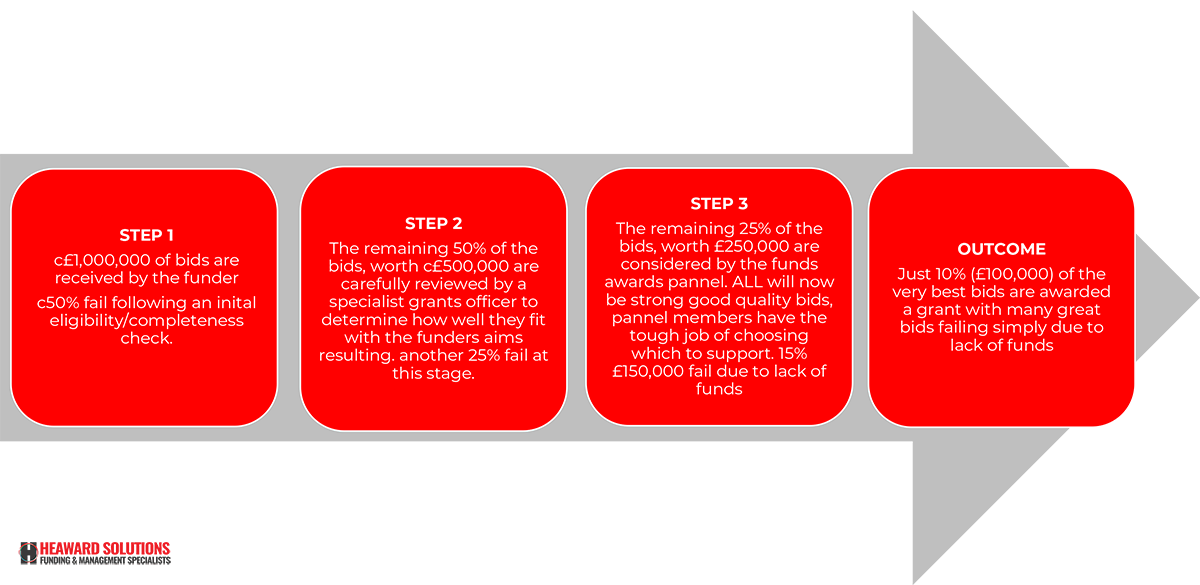
18 May 10 strategies to help secure funding application wins
Not every funding application wins…
Here are 10 strategies to help tip the odds in your favour
There are nearly nine thousand charitable trusts and foundations in the UK that collectively award over three billion pounds in grants each year. Stoke Friday advocate Andrew Heaward shares his top tips for helping to secure funding to ensure your charity or community group is able to meet its current challenges.
Despite so much money being up for grabs, the simple truth is that not every funding bid will be successful and competition for funding is incredibly strong. Indeed, several grant-giving bodies report that they can support less than 1 in 10 applicants.
Many not for profit organisations, especially social enterprises, smaller charities and community groups all too often take this as a signal that bidding for grants is ‘just too hard’. They feel that the range of potential funders is daunting, that good information and guidance are hard to come by (often prohibitively expensive) and the odds of success are stacked against them. It doesn’t need to be like that… several strategies can be adopted to help:
1. Invest in a funding search performed by an expert
This exercise can often be performed within a matter of days and at a very low cost, for example, Heaward Solutions charge just £150. Even if this is the only external support you can afford, this kind of report can be hugely beneficial in saving time and effort and will help match funding opportunities to the key characteristics of your organisation, its specific needs, legal structure, experience and capacity.
Typically, funding reports identify between 50 and 130 grants an organisation might want to apply for. A good funding search report should provide advice on how to move forward and considering the factors above, recommend funding opportunities to prioritise action as well as providing a feel for the balance of risk and reward around each funding option.
2. Make sure you are eligible to apply
A huge percentage of bids are discarded before they are even properly reviewed because the applicant has failed to properly read the available guidance and applies for a fund which they are not eligible for. Making a bid without ensuring you meet all of the eligibility criteria is a complete waste of time and effort.
3. Provide what the funder requests and no more
As part of a bid, most funders will ask the applicant to supply copies of a range of key information. This can include all sorts of things depending on the funder and project, but often includes recent accounts and bank statements; key policies covering things like equity, health and safety and safeguarding; copies of planning permissions; a detailed business plan; and evidence to show where any match funding being offered is to come from. At best, failure to supply anything that the funder has requested will delay assessment and in many cases be enough to win you an outright rejection.
It is important to resist sending in lots of extra information that has not been requested because you feel it might help the funder understand why you need their support. Applications are normally assessed in a fairly short period and the case office making the assessment will not appreciate unwanted information to sift through and is therefore likely to discard it unread. What can be effective where the application process allows it is to try and use a small number of photographs within your bid as these can help the funder to quickly get a feel for your project, your organisation and its impact.
4. Make your case as effectively as possible
This is the most important part of any bid and is the applicant’s opportunity to explain why they should be supported. The single most important thing to remember here is to craft your response around how you can help the funder meet their outcomes. These are normally set out in the guidance or can be established by carefully reading whatever information they provide. The hardest bids to prepare are those where the funder’s outcomes are extremely general or nuclear.
Expect to be required to supply evidence to show why your proposal is needed and will work. This evidence normally takes the form of qualitative information such as consultation, survey data and letters of support from relevant stakeholders combined with quantitative facts drawn from statistical sources such as the census and the Government’s Index of Deprivation. Wherever possible quote facts, figures and provide real-life case study data to support your case.
5. Be concise and do not exceed any word cap
To help streamline the assessment process a funder will often restrict the maximum length of the response to a specific question or the overall application. This cap should be treated with respect and never exceeded.
With practice, it is possible to write in a clear and concise form that uses every available word to support your case. This takes a lot of practice and several passes over your text to fully optimise your response. For the novice bid writer, it can be helpful to get one or two people to read your responses and provide feedback.
6. Build a realistic project budget
When building the budget for your bid be realistic. Only ask for help to fund things which are needed and never establish the maximum grant value then seek to find ways to ask for that. Funders see MANY bids each year and have become skilled in quickly understanding the basis a bid has been developed on. Simply ask for what is needed to deliver your project.
When getting quotes, try and obtain three or more prices wherever possible. Many funders will only fund the lowest of three prices, so think carefully about which quotes you want to submit. Avoid quotes that are unusually low unless you understand why and are confident that the goods or services will be adequate. Equally don’t ask for the ‘gold standard’ because it’s being paid for by someone else, think about the costs as if you were paying for them personally and seek to find a good balance of value and utility.
When assessing bids funders have challenging decisions to make. They almost always receive many more requests than the funds they have available. Very large bids and those asking for the maximum award will be held to the highest standards at assessment and will need to deliver to be successful. Often, funders have an unwritten preference for supporting more causes at a lower level to help spread the impact of their support
7. Provide match funding
Not every funder requires match funding which can be defined as a contribution from the applicant or a third party which has a financial value, but most appreciate it when you offer some. Funding ratios vary, with 70% from a funder and 30% match funding is common, but some funders can only offer lower percentage contributions and 50/50 or less isn’t unusual. Even if 100% funding is available, offering some match funding will normally help a bids chance of success as the applicant is ‘invested’ in the project.
There are lots of ways to provide match funding:
- Match funding doesn’t always need to come from the applicant. Whilst it is often complex, you can match two or more funders’ contributions against each other.
- Whilst match funding from the applicant is often hard cash, for some funders volunteer time can count. The key is to establish a market value for the hours contributed. If this is impossible £10-15/hour is normally acceptable.
- Finally, ‘gifts in kind’ offer a good way option. These reduce the total cost of the project by providing key aspects free or at below-market rates. A free/low-cost lease from a third party can often be counted at its market value.
8. Consider using a specialist
You can find several specialists, including us, who earn their living by helping organisations apply for funding. Of course, these services come at a cost and no bidding exercise is ever risk-free. Using a specialist consultant can bring significant benefits in terms of a consultant’s ability to bring extra capacity, relevant experience, specialist knowledge, and valuable skills to a project. For most organisations, this contribution will normally significantly enhance the change of making a successful bid.
There are two ways in which this kind of support can be secured. A contingent fee agreement, also often known as ‘no win no fee’, or a straightforward service contract. Most companies will offer one or the other approach and each has distinct pros and cons as described below.
- Contingent fee agreements:
In this scenario, the client pays no fee unless the application is successful and the fee payable to the consultant is calculated as a percentage of the bid value. Because the consultant is carrying the client’s risk their fee will be significantly larger than under a service – this is to contract to account for work done on projects that are not successful and fees often reach 10-15% of the grant value.
Contingent fee agreements can be problematic as an increasing number of funders will not allow these costs to be met from any grant award. As a result, applicants need to ensure that they have sufficient funding available outside of the grant or any associated match funding to meet this bill. It is important to remember that ‘hiding’ these fees within the grant budget is likely to be fraudulent and can lead to all sorts of legal issues. (Heaward Solutions do not offer contingent fee agreements).
- Service contracts:
Service contracts are far more straightforward because the applicant carries their own risk and pays the consultant as work is completed. The downside is that should the bid fail the applicant will be out of pocket to the value of the fees paid. Fees charged on this basis will typically be much lower than under a contingent fee agreement as the consultant does not need to price in for carrying some or all of the risk.
Fees in this scenario are normally payable in regular stages over a term agreed with the consultant. As with a contingent fee agreement, these costs cannot normally be funded from any grant that may be secured and thus the applicant needs to identify how these will be met from other funds.
Whichever approach works for you it is important to be aware that the applicant organisation will need to do a significant amount of work even if you engage a consultant, as much of the information needed for inclusion in a bid can only come from the applicant.
It is rarely economic to use a specialist to write small bids unless you establish a program of work but many specialists are happy to act as an editor or even provide grant writing training to help you maximise your chances of success with this kind of bid.
9. Understand what happens after your bid is submitted
When working to secure grants most of the ‘magic’ is done before submission, but it is really useful to understand what happens after you hit ‘submit’. Typically, this can be divided into three steps as set out below.
It is not unknown for the more the professional funders to contact applicants during the assessment (steps 1 and 2 below) with supplementary questions. Sometimes these are already addressed in the bid and have just been missed. Other times, the information requested in the bid has raised a query that the funder cannot answer from the bid. Receipt of a request for supplementary information should not be seen as an indication that the bid was in any way deficient but equally, it cannot be taken as a signal that the funder is favouring the bid.

10. Be wary of any guarantees offered
A very important message to take from the process above is why no one can guarantee success. A good bid writer should be able to ensure that a project gets past steps 1 and 2 above, but once it reaches step 3 this becomes impossible as the project will be reviewed against several other equally good schemes and a wide range of factors can influence the funder’s decision making. Often, projects can get rejected at this stage, not because of any flaw but simply because the funder has not got sufficient funds available to support every bid and another has caught their eye.
Even professional bid writers cannot win every bid they submit and at Heaward Solutions we are happy to achieve average success rates of between 70-75% of the bids we prepare.
After submitting a bid often, the applicant will hear little or nothing from the funder for up to three or four months, sometimes much longer. Also, some funders will not even advise you if you have been unsuccessful.
Conclusion
Whilst securing grant aid can be hard work and inevitably you will sometimes fail, it’s not impossible, yet far too many organisations are scared to even try. Hopefully, this post has provided useful strategies that will encourage you to look at this valuable way to further develop what you can do.
If you want to know more or explore how your organisation might be able to access grant aid, sponsorship or crowdfunding, Heaward Solutions offers a free initial discovery meeting and will even buy you a ‘virtual’ coffee!
Andrew can be contacted on 07983 655832 or email [email protected].


Sorry, the comment form is closed at this time.